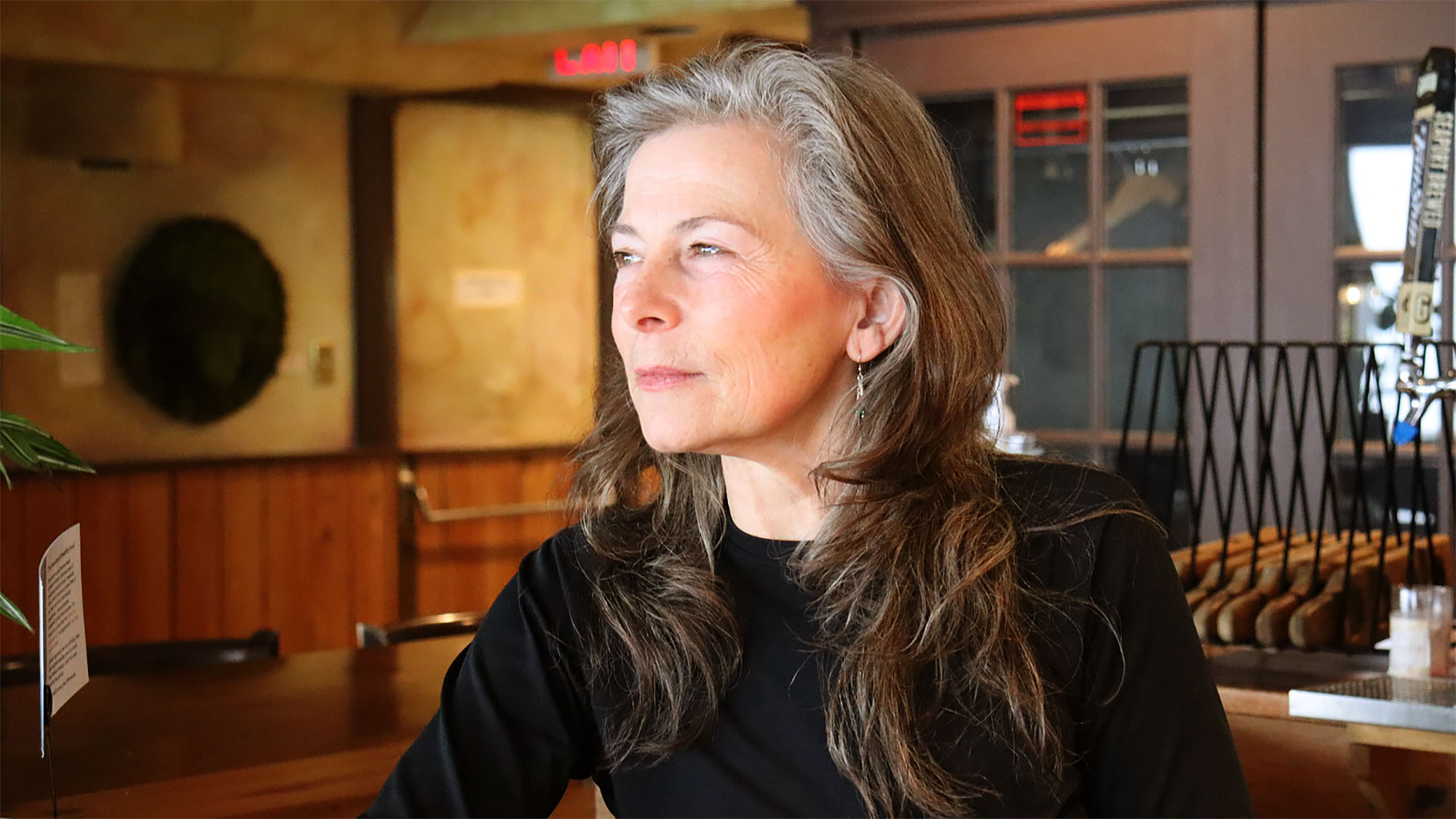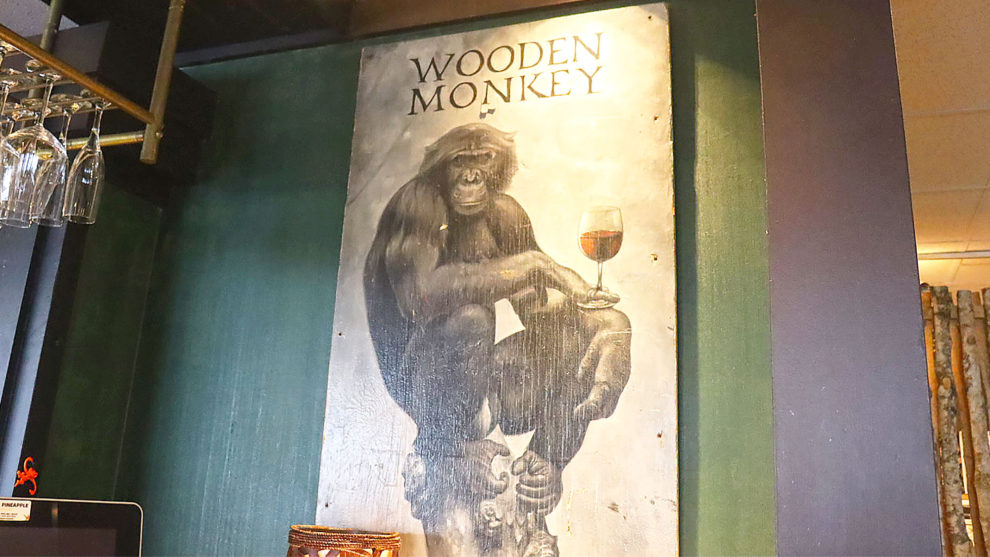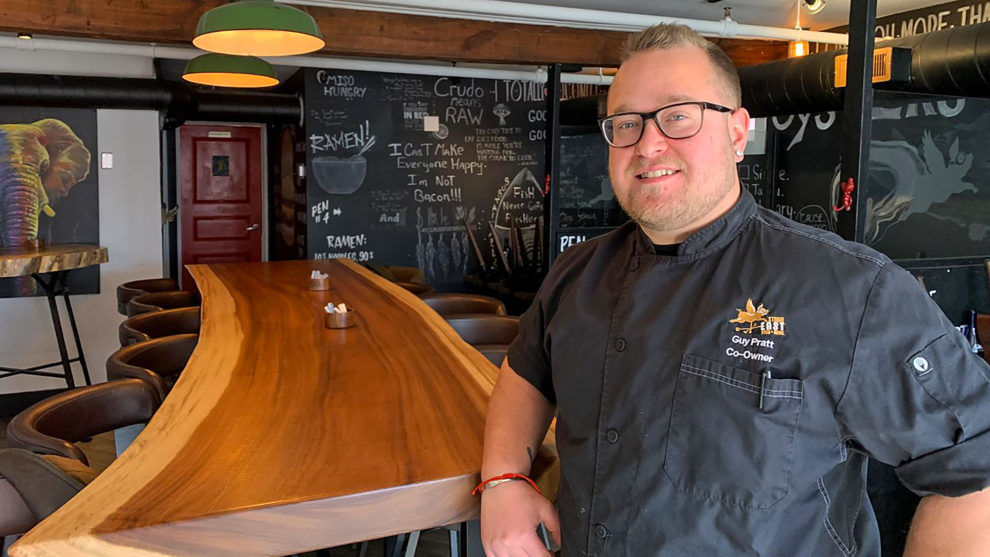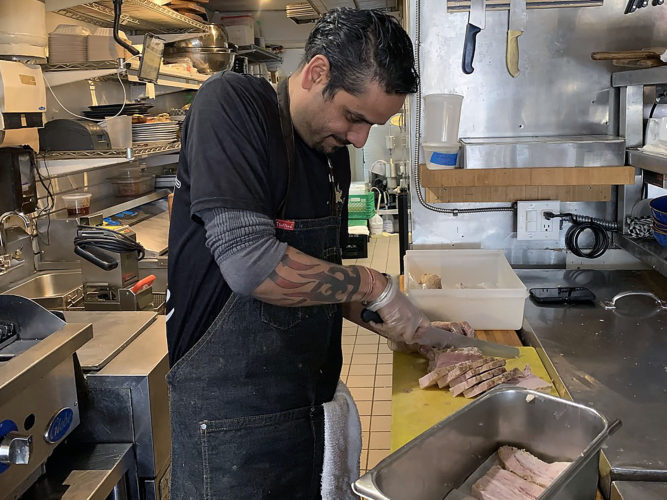Handling the heat

caption
Lil MacPherson poses for a portrait at the Wooden Monkey on Alderney Drive (Jake Webb.)Restaurateurs tackling mental health challenges – their own, and their staffs’
There are 97,000 restaurants, bars and caterers in Canada. In the last three years 13,000 of them closed permanently, almost one of every eight. Among the survivors was Nova Scotia’s own Wooden Monkey.
Lil MacPherson, co-owner of the Wooden Monkey in Halifax, remembers a most stressful time at the start of the pandemic: the day she laid off her staff and told suppliers the restaurant was closed. She spent most of the day on the patio, the wind blowing in from the harbour, forgetting that it was only March. Dedicated staff members came one by one; in the scary first days of COVID she thought it safer to meet in the fresh air.
In between staff members MacPherson phoned the 45 suppliers that she had worked with since the Monkey started, people who relied on her business. These were sad conversations, even mournful. MacPherson needed the Monkey to open back up, not for her – for them.
“If you feel like you’re drowning, learn to dive.”
Lil MacPherson
Before COVID hit there were 22 million daily trips to restaurants made by Canadians, more than 15,000 every second. The restaurant industry has since been ravaged by the pandemic. Even now, with restrictions lessening, there are rising food prices and staff vacancies. A recent Statistics Canada poll found 46 per cent of restaurant owners claim to be worse off now than in 2019.
Everyone has heard of favourite restaurants closing, like the family-owned Athens on Quinpool Road, which closed in 2021 after serving people for nearly 40 years. But not many know how, during these trying times, the people behind the tasty food and smiling welcomes have managed their mental health.
In Nova Scotia’s oven
Bars and restaurants decorate Halifax’s downtown like spots on a dalmation’s back. Every Haligonian has a story about an eventful night out, an amusing waiter, or how to find the best donair. While many claim that Halifax has the most bars per capita in Canada, it’s actually second to St. John’s, Nfld. Nonetheless, restaurant culture is an important part of life in Nova Scotia. This made the last couple of years grueling – as beloved restaurants struggled to stay afloat.
Both Monkeys have open rooms and big tables. A painting greets customers even before the host does: a monkey drinking a generously poured glass of red wine. (MacPherson points it out with a giggle.)

caption
The original painting depicting the Wooden Monkey mascot (Jake Webb.)MacPherson’s anxiety comes from the lack of food security in Nova Scotia. Climate change terrifies her. Her system for staying mentally healthy, she explained with flamboyant hand movements, is to pretend everything has gone wrong – the Monkey out of business, everyone she knows catching COVID – and then picture how she would start back up again. In this exercise, her first priority is to focus on the good news about her loved ones. “Nobody’s died.”
MacPherson worked as a waitress before owning the Monkey, and says that if the worst that could happen to her was a return to waiting tables, she was going to be alright. She calls her method the “failure box,” and says it got her through lockdown.
“If you feel like you’re drowning,” she says, “learn to dive.” She says that COVID forced her to become a pretty good diver.
While MacPherson is the environmentalist talking to farmers and politicians about sustainable food practices, co-owner Christine Bower is the operator who runs the restaurant day-to-day. Bower does not want to “glorify” restaurateurs; she says other industries are struggling just as much. Still, she tries to do her part by caring for the mental health needs of the staff.
MacPherson says with a smile that Bower mothers the employees, always giving time off if needed and letting them know they can always talk to her. Both owners recognize that supporting their employees’ mental health is crucial to operating a restaurant.
One of the reasons the Monkey didn’t shut down, MacPherson said, is because people “know” it. She said she’s happy she isn’t starting a restaurant now or, worse, didn’t get one right before the pandemic.
Blood family, work family
Guy Pratt owns Studio East Asian Gastropub on Cunard Street in Halifax. He and his brother André took up ownership from Ray Bear three years ago – right before the pandemic.
Pratt’s father, Bill, is the founder of the Chef Inspired group of restaurants, and owns several restaurants and food trucks in Nova Scotia. Pratt says that when he first took over Studio East, his dad was his coach.
“I’ve got two families,” Guy Pratt says. “I have my blood family and I have my work family.”

caption
Owner Guy Pratt in his restaurant Studio East.Dad Bill helped out when Studio East almost shut on May 15, 2020 because it couldn’t afford rent. That’s why Guy instantly agreed when Bill asked him to help “close all his locations down.”
Pratt walked into Habaneros Modern Taco Bar in Woodside, Dartmouth, the first location to be closed. The usually bright orange and green colours seemed dull and boring. What he associated with bustling crowds snarfing down cheesy tacos was now completely devoid of life.
Pratt stayed on the front lines at several of his father’s restaurants, serving food behind a glass shield. Studio East, too, did takeout. The constant stress of needing to generate cash flow, he says, cost him some sleep. Fortunately, his two families kept him motivated.
Thanks to loyal customers and government grants, Studio East is now back to full strength. Pratt talks excitedly about the improvements he has planned – including a bigger location and more weekly bao buns.
Set mental health to bake

caption
Studio East cook Amit prepares for dinner.When Bruce McAdams worked in the restaurant industry 30 years ago, staff would cry in the fridge. Despite the temperature and dangling meat, the walk-in fridge was a haven from supervisors telling staff members this dreaded phrase: “suck it up, buttercup.”
Now McAdams is an associate professor in the School of Hospitality, Food and Tourism Management at the University of Guelph. He believes that the mental health challenges of restaurant workers are now being taken more seriously.
After seeing restaurateurs forced to “duct tape and MacGyver” their way through COVID, McAdams published a study in December 2021 in the Journal of Human Resources in Hospitality & Tourism with fellow Guelph professor Monica Gallant. The study looks at how restaurant leaders – owners, operators, managers – dealt with staff mental health challenges. He found that leaders wanted to help the staff, but didn’t know how.
McAdams says that three years of COVID have been difficult for the industry. To move forward with better care for workers, he says, the stigma of mental health needs to be eliminated.
McAdams wants governments to mandate mental health training alongside the food safety and alcohol courses required to work in this field. With mental health training overseen by each province, fewer workers would get lost in the crowd.
In Nova Scotia the restaurant industry is overseen by government and business interests. One of them is the Restaurant Association of Nova Scotia. Gordon Stewart, the executive director of RANS, describes his role with the association as “chief cook and bottle washer.”
He oversees operations, from providing guidelines on how to run a restaurant to meeting with government officials about key issues affecting the restaurant industry. During the height of the pandemic his main job was informing restaurateurs about quickly changing provincial COVID policies.
There are 400 members of RANS, each representing a restaurant. During lockdowns, everyone was trying to learn as much as they could about the virus. He says he received 500 emails and up to 100 phone calls a day, from both members and non-members. They all needed help.
Stewart’s mental health took a hit as he could never escape work. He was on call 24 hours a day, seven days a week. He saw his family less often. Today he calls himself one of the “lucky ones.”
He managed to stay mentally solid partly by dividing the day into easy-to-do tasks. He felt he had a duty to uphold; he could not afford to break down. Too many people counted on him.
Now his priority are RANS events like Dine Around and the Savour Food & Wine Festival. This is its second year back after lockdown and, despite the winter being the slowest part of the year, tickets sales for both upcoming events are the highest they have been in nineteen years.
Stewart is desperately trying to bring Nova Scotia’s restaurant industry back to full strength. High prices, though, are making 2022 and ’23 difficult. In April 2022 Canadians paid six per cent more for a meal than in 2021. While recognizing the stress that restaurateurs are under, Stewart does not have any events planned highlighting their mental health challenges.
Ordering mental health resources
On the other side of the world, meanwhile, Mind HK, a Hong Kong mental health charity, called attention to the mental health of restaurant owners by holding a Mental Health Restaurant Week in October 2022. It came following a Mind HK study which found one in five Hong Kong citizens were experiencing mental health challenges – more than a million people.
And so was created Mental Health Restaurant Week, aka Food for Thought and Time to Talk. Mind HK partnered with more than 50 restaurants in Hong Kong to bring awareness to the mental health struggles of those in the food industry.
Closer to home, in October 2022 Restaurants Canada posted a webinar teaching owners how to support the mental health of people working in restaurants. Hosted by a health and safety consultant and several owners, it is a free resource dedicated to helping restaurateurs.
The Nova Scotia Health Authority has free mental health resources on its website, but none tailored to the restaurant industry. Perhaps the provincial government was more concerned with the business side of restaurants, rather than mental health. Lil MacPherson says the grants issued by the government saved the Wooden Monkey.
MacPherson says business looks to be returning to normal, and she doesn’t know what the future holds. The best way to confront the “epidemic of mental health” troubles, she believes, is by upgrading your diet.
You can do this, of course, at the Wooden Monkey.
About the author
Jake Webb
Jake Webb is a fourth-year student in the Bachelor of Journalism (Honours) program at the University of King's College.
